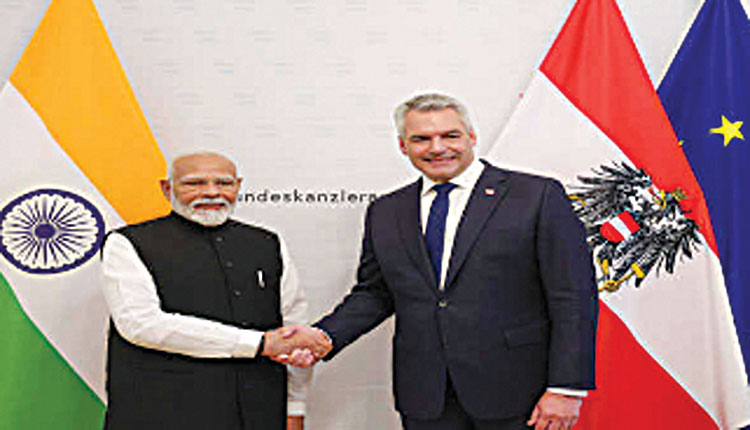PM Modi discusses Ukraine with Austrian Chancellor, stresses that problems cannot be solved on battlefield
Vienna/New Delhi, July 10 (FN Agency) Prime Minister Narendra Modi on Wednesday said that he had held frank discussions with Austrian Chancellor Karl Nehammer on the Ukraine conflict and emphasised that in the case of ongoing conflicts in Ukraine or Gaza, ”problems cannot be solved on the battlefield” and “that this is not a time for war”. His statement came as Austrian Chancellor Nehammer said since PM Modi had paid a visit to Moscow and held talks with Russian President Vladimir Putin, “it was important for me to hear the Prime Minister’s personal assessment” of the issue. Nehammer also said that India and Austria had a “shared objective for comprehensive peace in the region”. PM Modi, in his remarks, after holding delegation level talks with the Austrian Chancellor, said “We had frank discussions on the troubles in the world, whether in Ukraine or the Middle East. I have said earlier that this is not the time for war, and resolutions cannot be found in the battlefield, and the death of innocents anywhere is unacceptable.”
“India and Austria emphasize on dialogue and diplomacy for the earliest possible restoration of peace and stability. We are both ready to provide every possible cooperation to achieve this,” he added. PM Modi said that their shared belief in values such as democracy and the rule of law forms the strong foundation of the bilateral ties. “Mutual trust and shared interests strengthen our ties.“ He said the two leaders had held very meaningful discussions, and identified new opportunities to further strengthen the cooperation. “We have decided to provide strategic direction to our relationship.” A blueprint for cooperation over the coming decades has been prepared, which will not be limited to economic cooperation and investment alone. “We will work to combine our strengths in areas such as infrastructure development, innovation, renewable energy, hydrogen, water and waste management, artificial intelligence, and quantum technology. To connect the youth and ideas of both countries, the start-up bridge will be accelerated. An agreement on mobility and migration partnership has already been reached. Exchanges between cultural and educational institutions will be promoted,” he added.
The two leaders also shared their thoughts on climate change and terrorism. PM Modi said he has invited Austria to join the International Solar Alliance, Coalition for Disaster Resilient Infrastructure, and the Biofuel Alliance. Both strongly condemned terrorism. “We agree that it is unacceptable in any form and cannot be justified in any way. We agree on the need for reforms in the United Nations and other international institutions to make them more contemporary and effective,” the PM said. PM Modi also said that he is happy to visit Austria at the very beginning of his third term in office. “This visit of mine is both historic and special. After forty-one years, an Indian Prime Minister has visited Austria. It is also a pleasant coincidence that this visit is taking place as our bilateral relations complete 75 years.” He extended best wishes to Chancellor Nehammer and the people of Austria for the upcoming elections in the country.
The Austrian Chancellor, in his remarks, said that Austria shares very good relations with India, based on trust. He said he had “very intensive discussions on the Russian aggression on Ukraine” and that “it is important for us to know India’s viewpoint and to understand it and familiarise India with the European concerns and worries”. “What unites India and Austria is concern over the development of the geopolitical situation,” he added. Nehammer said that Austria has delivered $250 bn in aid to Ukraine. He said the two leaders had discussed the unique position of the Global South and India’s role in highlighting the issues of the Global South. “India’s role for Austria is more than important when it comes to the peace process and the future peace summit and Austria will be available for dialogue,” he said, adding that it will be as a member, and not part of NATO.

